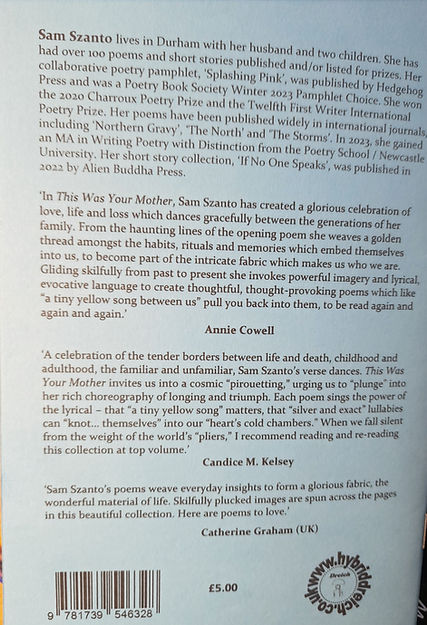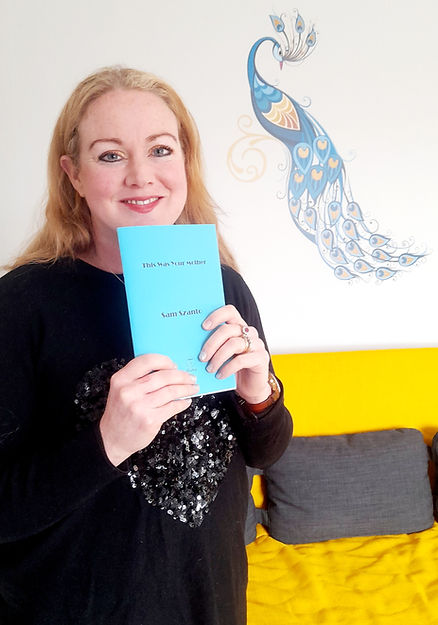20 Questions with... Laura McPherson
- samszanto2
- Nov 10, 2022
- 6 min read

Laura McPherson (she/they) is based in Chicago. She has a day job as a freelance writer and editor and is also an ESL tutor and writing coach. Her creative work has appeared or is forthcoming in Night Picnic Journal, Cosmic Horror Monthly, The Deadlands, Corvus Review, and others. Her hybrid chapbook, inVISIBLE, is out with Alien Buddha Press.
Twitter: @silversatire
Please introduce yourself. Where are you from? What was your life like growing up?
My name is Laura McPherson, and I am a writer, editor, and educator. I live in a suburb of Chicago by way of Kentucky, with stints in Las Vegas here and there. I grew up in a haunted Victorian house in a community plagued by radioactive industrial waste. It’s just recently I’ve begun to realize how much this has influenced me and to confront it in my writing.
Did you always want to be a writer? If you also work, what do you do / did you do?
I knew I wanted to be a writer from the second grade, when someone inexplicably decided to give me a copy of Stephen King’s The Gunslinger alongside Brian Jacques’ Redwall. Eight-year-old me was pumped to discover other worlds than these, but for the next couple of decades people would remind me that writers don’t make money. It wasn’t until after I had tested a variety of wild career paths (truck driver, parole support agent, seasonal retail decorator—you know, the Jack London/Chuck Palahniuk journey) that I started getting paid explicitly for writing, in 2011. These days nonfiction and teaching pay the bills, but creative writing pays the spirit.
Tell us about your most recently published work in a sentence.
inVISIBLE is an experimental journey across chronic illness and capitalism with brief stops to wink at the gods and pray for hope.

What are you working on right now?
I’m working on a weird historical fiction novel that takes place in the 1990s about a guy who sells bowling balls and a clairvoyant clown named Claire Clair. And I have a long nonfiction essay in progress that backlights my disaster exes against my absolute love for disaster movies.
Do you have a writing routine, and if so what is it?
On days I’m going to write it must be the first thing I do, before my head gets filled with the day. If it’s one of my husband’s work-from-home days, that means getting up around 4 AM. If he goes to work, I can push that back to 5:15 AM so I get up right after he leaves. I need quiet and focus to do good creative work, especially in early drafts. Editing is more flexible, thankfully.
Where do you write – always in the same space, or different places? Can you write ‘on the move’?
I write almost exclusively in my office, although sometimes I’ll work on longhanding something from bed. I’m not a coffee shop worker; I can’t even read the news in a busy environment.
What advice do you have for other authors who are starting out? What is the best advice you’ve heard?
For those who are just starting, actually start! For a long time, I would tell people I wanted to be a writer and then…wouldn’t write. I don’t think I set down a word between the ages of 21 and 26, although I did huge amounts of reading during that time.
Do you enjoy doing live readings or are they a necessary evil – or somewhere in between?
I have a love-hate relationship with public speaking, but it’s a true joy to get to do it in front of people who are there because they want to be.
Are there recurring themes in your work? Where do you feel these emanate from if so?
I have a lot of ecocrit, identity theory, love-is-not-this-perfect-thing, and pansexual themes going on. And it usually turns speculative, gothic, or weird. I also slip a lot of deep cut internet references into my writing along with nods to industrial music and 90s pop culture.
Should writers have a moral purpose? What is the purpose of a writer in today’s society?
I don’t think that creative writing is required to have a moral purpose. For example, erotica can be instructive, but it does not have to have a moral. I think the purpose of writing is to share information, to share a truth or truths. Sometimes that’s just to tell a story, but other times it’s to help someone see another side or another way. The best writing does both, though.
Do you write between genres or not?
Almost always. My experimental chapbook inVISIBLE is CNF, poetry, image, even a little music. I also write speculative CNF, speculative poetry, and weird historical fiction. Occasionally, an editor will think I miscategorized a submission because they’re trying to read my nonfiction as fiction!
Which living writers do you most admire?
Thomas Pynchon, for how he helped legitimize weird and erotic writing as literary writing, and because he was one of the last writers able to be a writer without being a personality. I quite admire Colson Whitehead, Rivka Galchen…but if I list too many, omissions begin to seem offensive.
Which dead writers do you most admire?
bell hooks, not just for the strength of her ideas and writing but how much of it she gave to the world. Cervantes for inventing the modern novel (who just invents a genre?). Herman Melville, for similar and weirder reasons. Hilary Mantel, for the depth of her research and prose. Lots of writers who came up more or less rough but succeeded!
What’s the book you wish you’d written?
The Road by Cormac McCarthy.
What other external influences do you have: nature/place, music etc?
I think every little piece of my experience makes it into my writing, one way or another.
Do you suffer from ‘writer’s block’ and how do you overcome it if so?
I used to think I had writer’s block, but now I recognize I was experiencing a kind of writer’s fear. But you have to write to be a writer. One thing that helps with this is having an ideas document. Anything that’s not already started in draft is in the ideas document so I can grab a line, or a mini outline, or a title, and go. I super recommend this, as well as having multiple drafts in progress if you are up to that (the more different, the better). That way if you’re not in the mood for—I don’t know, examining childhood trauma—you can write about vampires. Or clairvoyant clowns. Or the ecological crisis. You give yourself options.
What’s been your favourite reaction to your writing?
I asked my husband to proofread a short story about a zombie fungus that attacks humans. Later he came into my office, white as a sheet, shaky hands, looking like he was going to throw up. Turns out that as a kid he had had a recurring nightmare about brain-eating fungus and he’s still super terrified of that sort of thing. I had no idea. But hey, now I know I can write something legit scary! Keep an eye out for “Eigengrau,” coming out in Ghostlight: The Magazine of Terror this spring.
How do your family and friends feel about your writing?
I’m lucky to have the most supportive groups of friends, both in and out of writing. I’m thankful for that every day.
Do you have a favourite bookshop?
If I know what I want, I love Powell’s, ThriftBooks, and Better World Books. If I want to browse, there are a couple of brick-and-mortar used bookstores I love: The Book Lady’s Book Attic in Bartlett, IL and Scarcely Used Books in Addison, IL.
How do you see the future of writing? Will we become more or less dependent on Amazon?
In books, for self-pub I think Amazon has a lock on the market, but for trad pub, it might be losing its grip because it’s trying to get to price parity with other markets, making a bet that its convenience will win out over the price. But overall, as shipping times creep up especially, Amazon is growing less convenient for consumers; plus their markup is going to Amazon’s own coffers, not the publishers and authors. People are becoming more aware of that, I think, and players like Bookshop.org are catching up. And for used books you have so many other choices, with shipping free in a lot of cases. I think there’s hope.







Comments